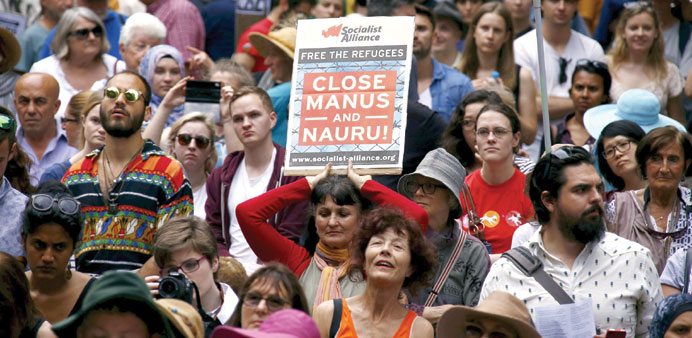Agencies/Sydney
Doctors treating migrant children in hospital are refusing to release them to Australian immigration officials who would return them to detention centres, local media reported yesterday.
Staff at Melbourne’s Royal Children’s Hospital said they could not allow children to be returned to detention centres where their health and well-being is threatened, the Sunday Herald-Sun newspaper said.
The hospital has been caring for dozens of young patients who were brought in for treatment from centres where they were held with their families.
For more than a month, hospital staff have rejected demands from immigration officials to release one child, and the refusal has now extended to more children in their care.
The government insists on returning the children to detention.
A total 104 children aged from newborns to 18 years old are locked up in immigration detention centres in Australia.
Another 93 children are kept the Australian-run detention centre on the remote Pacific island of Nauru.
Medical staff also expressed outrage that immigration guards were placed at the entrance to some patients’ rooms in the hospital.
Under harsh new government laws, the medical staff risk being jailed for up to two years for speaking out against conditions in immigration detention centres.
Nevertheless, more than 400 medical staff openly defied the government and posed for a group photo for the newspaper outside the hospital.
Hospital in a statement given to the broadcaster ABC on Sunday that doctors were treating children who had spent more than half their lives in detention centres.
“In children from detention, our team see children with nightmares, bed wetting, and severe behaviour problems, children from detention develop anxiety and depression,” paediatrician Paul Monagle said.
“It’s become so common that it’s almost normal in children from detention to have these symptoms.”
Immigration minister Peter Dutton said government policy would not change as it had stopped the flow of people making the dangerous journey trying to reach Australia by boat.
“I understand the concern of doctors, but the defence and border force staff on our vessels who were pulling dead kids out of the water don’t want the boats to restart,” Dutton told the Sunday Herald-Sun.
Thousands of Australians yesterday joined rallies calling for the closure of Pacific island camps for asylum-seekers, just days after the government confirmed it was in talks with the Philippines to resettle detained refugees.
Under Canberra’s tough immigration policy, asylum-seekers attempting to reach the island continent by boat are turned back or sent to camps on Nauru or Papua New Guinea and barred from resettling in Australia even if found to be refugees.
Chanting “free, free the refugees”, the protesters in Sydney, Melbourne and other cities said the government and new Australian prime minister Malcolm Turnbull should close the Pacific detention centres, which have been harshly criticised by rights groups.
With Australia set to resettle 12,000 Syrian refugees amid the crisis in Europe, some demonstrators waved Syrian and Kurdish flags and said the government should move those held in the camps to the mainland.
One asylum seeker, “Adbi”, who has reportedly been held on Manus Island for more than two years, called on Turnbull -- who came into power in mid-September after replacing Tony Abbott in a party coup -- to help the detainees.
“They are traumatising us,” Abdi said on a phone call broadcast to the Sydney crowd, adding that conditions at the Papua New Guinea facility were “indescribable”.
Medical professionals at the rallies also expressed fears a new law could block their colleagues working at the camps from speaking out if they had allegations asylum-seekers being abused.
“The government is using the Border Force Act to intimidate people from speaking out,” refugee advocate and rally organiser Ian Rintoul told AFP in Sydney.
UN Special Rapporteur on the human rights of migrants Francois Crepeau last month postponed a visit to Australia due to restrictions on his access to detention centres and fears that people who spoke to him could face legal reprisals.
Canberra has struck a deal with Cambodia to accept refugees in exchange for millions of dollars in aid over the next four years, although only four asylum-seekers have so far opted to take up the offer.
The government has declared its hardline policy to deter boat arrivals a success, saying that it has been more than a year since a vessel carrying asylum-seekers has arrived in the country.
Before the policy was introduced, boats were arriving almost daily, with hundreds drowning en route.

A rally in support of refugees in central Sydney yesterday.
